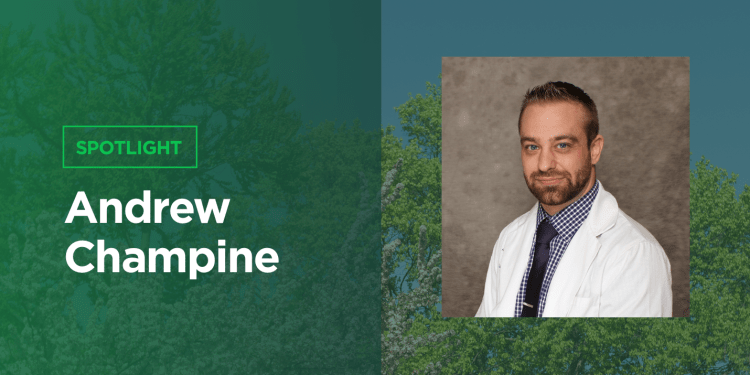Rising to the COVID-19 Challenge
Last Updated August 26, 2020

Unprecedented challenges require extraordinary solutions. Perhaps no one knows this better than Dr. Andrew Champine, the Director of Behavioral Medicine Education – Internal Medicine at McLaren Flint, in Michigan.
To help health care professionals handle the stress related to the COVID-19 pandemic, Champine is working with colleagues to develop a behavioral health support program for McLaren’s approximately 22,000 healthcare employees across 14 hospitals and an extensive network of physician practices. People around the country are taking note of Champine’s efforts — the program has been profiled in a recent issue of the American Psychological Association’s newsletter, the Monitor.
Champine is currently pursuing a Master of Science in Healthcare Management at Michigan State University, and he credits his coursework with giving him the skills, knowledge and confidence to build a comprehensive mental health support network quickly and efficiently.
“When COVID hit, we really saw this as an opportunity to not only serve our patients, but also, importantly, to take care of our professionals on the front lines,” Champine said. “We were called upon quickly to devise a strategy for a systemwide behavioral response. I used a lot of the skills that came up through my business management training.”
Designing the Program
Champine and his colleagues had to start from scratch to design their support program: As there hasn’t been a pandemic like COVID-19 for decades, there was no blueprint for them to follow. “We had to look at acute stress and trauma in other capacities and recognize that, at the end of the day, some of those emotional support strategies were ubiquitous,” he said. “But thinking outside the box was one of the pieces that really helped us respond so quickly.”
It was important to Champine that the support program could evolve as healthcare workers’ needs changed. Early on, the program helped frontline workers deal with uncertainties like use of PPE, managing stressful thinking, and mask claustrophobia. Later on, the program pivoted to help people deal with grief and reduce opportunities for burnout and exhaustion.
While the pandemic won’t disappear anytime soon, “presently, I think we’ve hit the ‘new norm’ phase,” Champine said. “Resources seem sufficient, and we’re transforming a bit into long-term, post-trauma responses.”
The support program engages healthcare professionals in many ways, such as consultations with mental health professionals, group discussion sessions, informational videos, self-help guides and a directory of resources. Since its launch at McLaren, the program’s virtual content has been accessed around the world. “It has been well received,” Champine said.
A Holistic Approach
Champine, a fellowship trained health psychologist, said the support program was designed around a humanistic-existential philosophy, which “sees human beings as more than the reducible components of their parts.” Addressing the combined physical health and emotional needs of the whole person are extremely important elements of the APA-accredited Michigan Center for Advanced Psychological Training program that is run at McLaren.
In a humanistic-existential framework, humans can recognize and realize their potential for growth. There is a focus on dignity, empathy and the ability to heal.
“It’s a more holistic vision of humans and well-being,” Champine explains.
An MSU Education Without a Campus Commute
Champine said the 100% online classroom has provided him with the flexibility to study at a leading school like MSU without compromising his job duties at McLaren.
“Not having to go to Lansing has been a huge advantage to the program,” he said. “The program was quite responsive, and the structure is very supportive.”
Champine received partial tuition assistance from his employer.
Putting Knowledge Into Action
Champine said much of what he has learned in the classroom could be directly applied to the development of the support program.
“The classes were great sources of providing knowledge that helped me understand what kind of strategies could be employed,” he said. Learning about business analytics, for example, showed him how he and his team could measure the results from the support program.
“Components of strategy and the knowledge gained from the program have been invaluable in constructing this response,” he said. “I hope to use this as a platform to continue to permanently shape the new norm of healthcare at our institution.”
See how the Master of Science in Healthcare Management can support your success.

